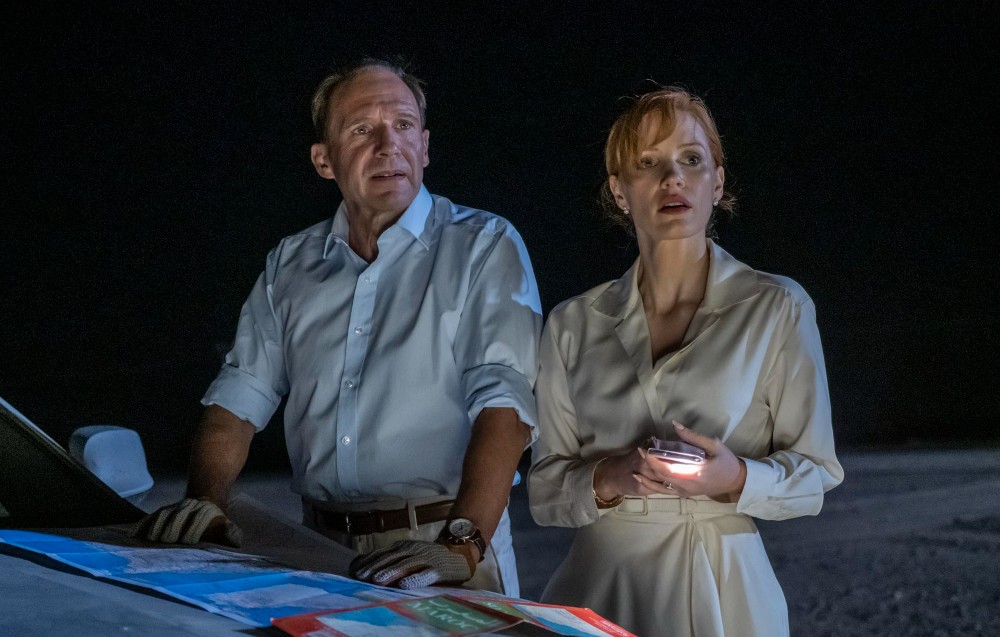
John Michael McDonagh came onto the scene with the one-two punch of The Guard in 2011 and Calvary in 2014, both of which were character-driven crime dramas set in the Irish filmmaker’s homeland that starred Brendan Gleeson. 2016’s War on Everyone was a very different kind of movie, a buddy crime-comedy starring Alexander Skarsgård and Michael Peña, and his new movie, The Forgiven, is another pivot from a director who is constantly growing and evolving as an artist.
Based on the 2012 novel by Lawrence Osborne, The Forgiven stars Ralph Fiennes and Jessica Chastain as David and Jo Henninger, a couple who travel to a remote area of Morocco to attend a lavish party in the middle of the Sahara. When their car accidentally hits a boy on the way to the party, they find themselves having to deal with the boy’s father and local traditions as David travels to the boy’s village to face the repercussions.
McDonagh was in New York for the Tribeca Film Festival premiere of The Forgiven a few weeks back, and Below the Line sat down with him and his wife, Elizabeth Eves, who is not only his producer but also the editor of this movie. Having the two of them together led to a lively discussion about the challenging production, which took place in the middle of the pandemic.
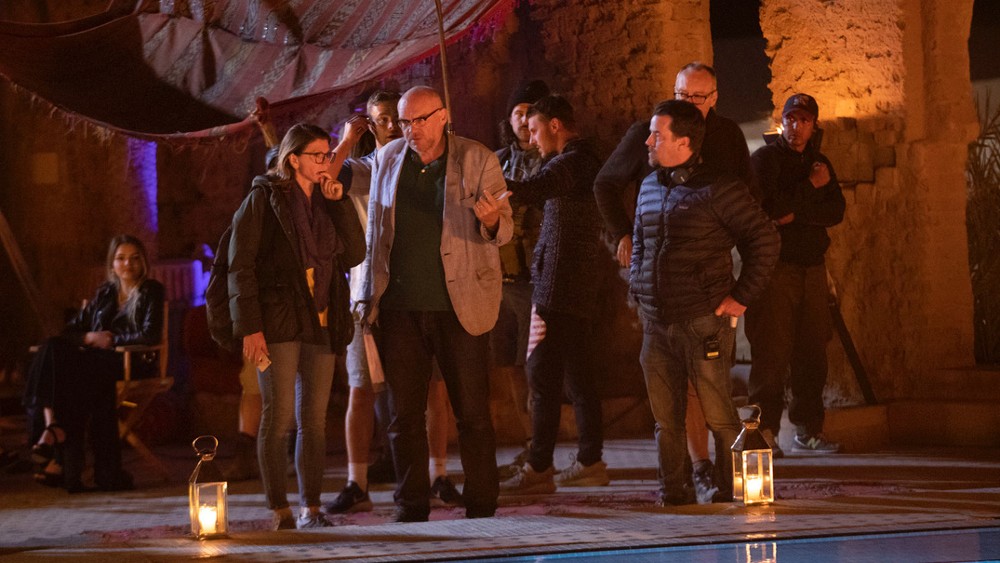
Below the Line: I guess one of my first questions could change the entire direction of the interview, so did you actually shoot this before COVID in 2019?
John Michael McDonagh: March 2020. We did four weeks. As we started shooting in Tangier, I was talking to Lawrence Osborne — he has a cameo in the movie, he’s the author. He plays the seedy ex-pat who raises his cane to lift a skirt or two at the bar. We were talking to him at the bar afterward, and we’d just heard about the pandemic. And he said, ‘It’s gonna be really bad. There’s going to be at least a quarter-million deaths,’ which was obviously an underestimate. He seems to know lots of different people, and we’re like, ‘No, that’s crazy.’
Four weeks later… My thing was the Premier League football in England was shut down, and that’s when the crew started to panic. [laughs] ‘It’s serious now, if they’re doing that.’ That was like a Thursday of the fourth week, or a Friday. By the weekend, it got really serious. We’d already moved on to our final location. We were already in the desert, and this was further out. It is all of Ralph’s scenes with Ishmael Kanater, who plays Abdellah (the boy’s father) so that long journey. They were preparing for that, so they had moved further into the desert, so myself and Ralph were still at a shi-shi hotel in the desert. The crew had moved onto a more rustic place, and Lizzie was there, and it basically all went over Saturday, Sunday, and on Monday, I got a phone call to shut down. We had to go…
Eves: I think on Sunday, we got notification from the Moroccan government that we had to leave the country because they were going to shutter the borders. We took them on their word, and then we had to move quickly. All commercial flights were shut down, so we had to charter a Boeing to get back.
McDonagh: And it was the last plane out of the airport. We heard a story that there were a couple of English crew members who were working on another film. They were in Marrakesh, and they went, “We’ll stay an extra day” and they were stranded for three months.
Eves: We were in our last week and we had to shut down, and we had to evacuate. So then, Morocco was shut for quite a long time, so over that period, we edited the movie, and then we were hoping to find finances.
McDonagh: To pay for all the delays, but luckily, virtually all the American and British cast were done. All the party stuff was done. Jessica is done, Matt Smith‘s done, Caleb Landry Jones, so it was only Ralph and the Moroccan actors, which made it a more compact sort of crew.
BTL: Was Morocco hit as hard or badly as other countries at that time?
McDonagh: It wasn’t hit like we were, because they closed down. It was Draconian the way they shut the country.
Eves: It’s not a country that has a robust health care system. It exists but…
McDonagh: You don’t really want to get stuck there. So then we go back in, we got the last five days, and it was Ralph’s storyline mostly, which is a massive body of the film. It was relentless, day after day after day, and I was cutting scenes as we went along, because we were just running out of time. As a filmmaker, you always have scenes — or you should have — that you know you can cut for necessity, if need be. It’s the old John Ford story when the producers come on the set, and say ‘You’re two days behind,’ and he rips up the pages and goes, ‘Now, we’re ahead.’ [laughs]
Eves: You can’t pull that shit with me.
McDonagh: No, but the thing is that John Ford must always have had scenes that he knows he can do that [with].
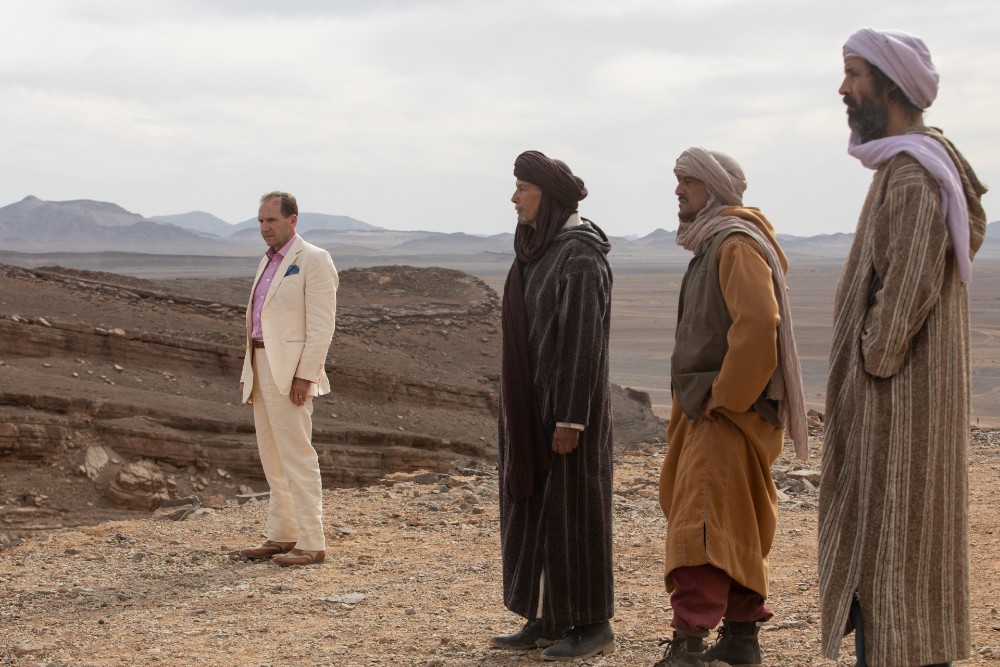
BTL: The reason I asked you that question first is that I would think that when COVID happened, it would have been harder to get a movie like this financed, or get all the actors to Morocco to shoot a movie. It would have been harder to get the movie started in the first place.
McDonagh: We were lucky in the sense that some of the Moroccan actors lived in America, but if they did get shut down when we went back again, they’re in their home country. It’s not a big deal. It was only really Ralph who was taking the risk that if there was another shutdown, he’s stuck there. He was fine with it, he was a real trooper, so it was great.
BTL: I want to go back a little since the previous three movies you directed were original screenplays, not adapted, so what was it about this book, which came out in 2013, that convinced you to adapt it?
McDonagh: In The Guard, the lead character isn’t an unsympathetic character or he seems that way a little bit, so in Calvary, the priest is unsympathetic, and then War on Everyone, the two cops are unsympathetic. I think it was the fact that Lawrence Osborne doesn’t care about whether the characters he writes are sympathetic or sympathetic — he’s just telling the story. Also, there was a kind of [Harold] Pinter quality to his dialogue, which was in my wheelhouse, so I felt that I could extrapolate from what he’d already done. And the plot was good.
I got rid of a subplot I thought was a little irrelevant, and it felt like it fit with the three films I’d already made, and I was always looking for a literary thriller in the kind of books I always read. Like those movies [Michelangelo] Antonioni made in the ‘60s and ‘70s, some set in a distant place, disaffected characters. Antonioni didn’t have witty dialogue, but there was witty dialogue in the book, so it was all that, and also, I don’t want to get pigeonholed as an English-Irish director. I’ve never made a film in England. I made two in Ireland. I want to be sort of like Nick Roeg — he made films all around the world, plus I like going on location, so it was all those things. All of Lawrence’s books — because he lives in Thailand, he’s an ex-pat — they’re all set in these disparate locations where terrible things happen to usually terrible people. That was always what attracted me to it.
BTL: You mentioned that you put him in the movie, so it must have been interesting to have the novelist involved in some way.
McDonagh: While I was writing the script, I was in contact with him a lot. I have this thing myself if somebody asked me a question about The Guard about a line of dialogue or plot point, I often can’t remember, because I’ve moved on, and he has the same thing, he’s moved on. I would often have a plot question, and I thought, ‘There’s a gun at the start, then it disappears for the rest of the book, and then it turns up at the end. Shouldn’t the gun have come back at some point?’ Lawrence’s reply was always, ‘Do whatever you want, that’s fine.’
BTL: Some of the authors I’ve spoken to have a similar attitude about others adapting their work, or otherwise, they’d just adapt it themselves.
McDonagh: I’ve spoken to Lawrence since, all of his books have been bought to be adapted, and he said I’m the only person who’s written the script whoever actually contacted him to specifically talk about plot mechanics. He was always puzzled about ‘Why has nobody else contacted me?’ and I said, ‘Probably because they’re hacks. That’s probably the reason.’ There were a few things, oversights, within his book. When you bring up an oversight by a novelist, you’re always worried that they’re gonna be offended, but he was never offended. He said, ‘Just do what works for the film.’
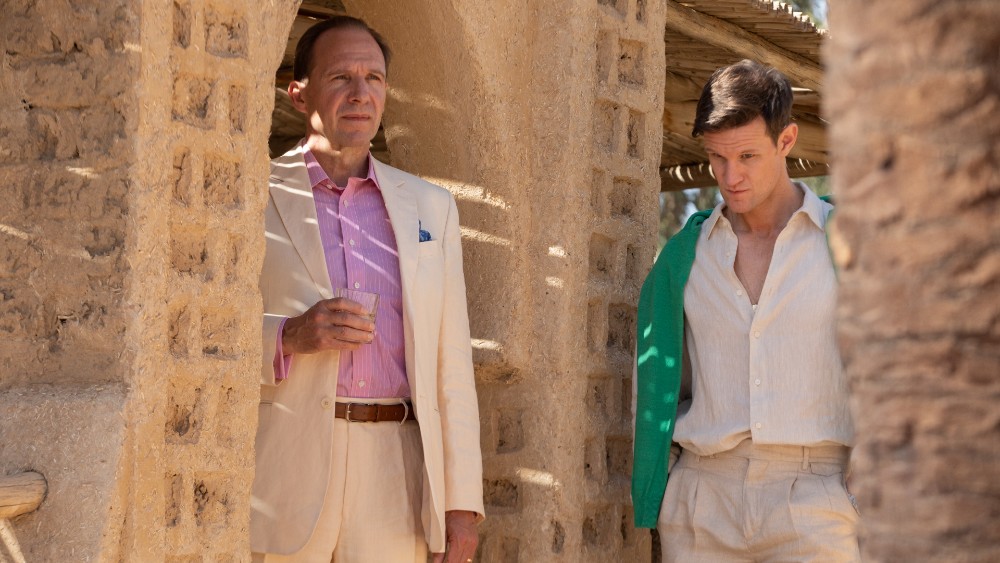
BTL: I found it interesting that your wife has been involved with producing your movies from the beginning, and slowly moved up the ranks, but on The Forgiven, she’s one of the editors. Were you always editing before or was this more out of necessity?
Eves: I come from a background that has an editing component to it. I mean, I come from a documentary, and I guess I had the technical skills. I’ve never edited a feature before but I’ve edited documentaries before. I’ve had experience in that realm, and I think it was really circumstances with COVID and the circumstances that created the opportunity. It worked really well. The way we set up the edit really suits the way John works and his specificity. The way we set it up meant that we had a longer [period] to go through the material rather than sitting in an expensive editing room with expensive machines, and the money ticking. He could take more time to look at his footage and understand what he had.
McDonagh: Actually two things, because of COVID, that lo-fi by necessity, you just stick to a small room. You don’t go into a big editing suite where there are loads of other people going around wearing masks. You can edit anywhere now, really, that was one thing. Number] two, obviously, was, we’ve been married for 20 years, so we had arguments about the edit, but it doesn’t become a personal thing where you’re arguing with the editor, judging him (or her) for making a mistake or something, it’s just a back and forth, so that was good as well.
Eves: And then, of course, John read the book, gave it to me, and I was like, ‘We have to get this, we have to do this,’ so I’ve been involved from the very beginning, so I knew the story better than anybody else.
McDonagh: And also, when we did the edit, we realized shots we still needed, and we went back to find the weak shots we didn’t need. So that was good, and trying to pare as much down as you can.
BTL: And you went back to Morocco sometime after the production shut down…
Eves: Six months after. So we shut down in March 2020, and then we went back to Morocco about six months later to shoot the last five days, which we called a continuation shoot, and then we were done. So we had most of the movie between the lockdown and when we returned after six months, and then came back and got what was left, and then we finished the post.
McDonagh: Of course, a lot of Ralph’s scenes go back and forth with Jessica’s scenes at the party, so when you’ve shot the scenes, you slot them in, that’s still going to change the film, so you still have to do another overview edit of the entire thing. You don’t just slot the scene in like that.
Eves: What we did was John’s cut — and he’s a final cut director — we did that cut, and then we took his storyboards and we put them in place for the missing scenes, and then we circulated that amongst our financiers and our partners and started the dialogue that way, and then just kept moving forward.
McDonagh: The main thing for me with the edit is I don’t think movies should be longer than an hour 45, but this had an epic scope, which is my longest run time but it’s still under two hours. I was quite proud of that.
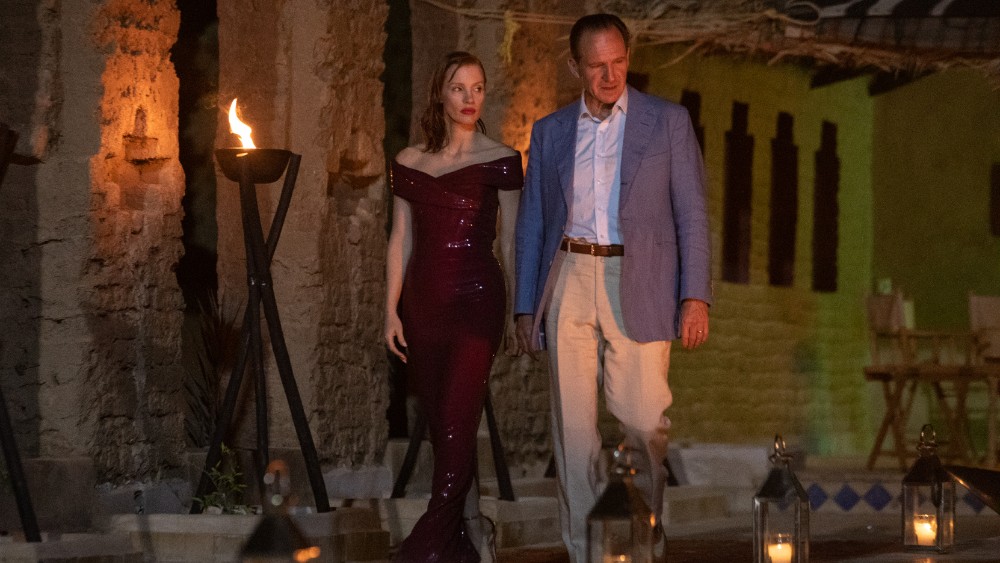
BTL: What about putting together the rest of your team as far as some people you’ve worked with before, and a few new people.
McDonagh: [Cinematographer] Larry Smith did The Guard and Calvary. He couldn’t get a visa for War on Everyone in time, so we got a really good DP called Bobby Bukowski. When you’re shooting in Morocco, you’re basically going to be using a Moroccan crew. British and Irish crew, the people I’ve worked with before, you’re not going to bring them from America because financially it doesn’t make any sense. So I worked again with Larry — I think it’s his best shot film. I think that’s the nature of the light in Morocco. There’s a lot of widescreen. The overview was lots of big widescreen and then big close-ups on actors faces. That was just the scribble concept of the movie. Larry did a great job. We had a really great costume designer, Keith Madden A really unusual production designer.
BTL: I saw his name in the credits, but I couldn’t find any other credits for him, so you found him there?
McDonagh: Willem Smit. There’s a really beautiful “Instagram hotel” in Marrakesh called El Fenn, and it looks amazing. We were standing there, and I said ‘Boy, this is what Richard and Dally, that’s how they designed their villa. It would be like this.’ We were thinking, ‘Who could we get to replicate it?’ And then we thought, ‘Why not get the guy who designed El Fenn?’ which is sort of a crazy decision.
Eves: He had no film experience, but he’s a designer based in Morocco. He’s a hotelier, and he’s got some background in theater, so he can run a project. He’s got all the right connections, and he’s got really beautiful sensibilities when it comes to that sort of thing.
McDonagh: That’s what happened, so it was kind of a mad decision. We had Willem and Ian Bailie, who was the supervising art director. Ian would do all the stuff like there’s a beautiful outdoor dining area that’s kind of raised up. All of Willem’s stuff was the designs of the lights and all that kind of thing, which was beautiful, but somebody has to physically make where they are on the dune, so that was the relationship between everything in the film – the paintings, all the decor, any kind of lamp, anything like that.
Eves: Color palettes.
McDonagh: I would tell him the color palette we want, but that would all be Willem, and then Ian would do the stuff like Abdellah’s house, sort of half-buried in the sand because Willem wasn’t interested…
Eves: [He] doesn’t do construction.
McDonagh: No, and also, Willem’s only interested in the more glamorous aspects of filmmaking.
Eves: He’s a very glamorous man.
McDonagh: Let’s put it this way. We got away with it, because it looks fantastic, but the villa is three different places, it’s not one place. But it looks like it’s one thing, so I was very happy…
Eves: Yeah, it’s stitched together well.
McDonagh: Obviously, the visual aspect was glamor, glamor, glamor, color. Into the desert, everything becomes, not monochrome but sort of brown, sandy, lo-fi. We used what was found there, so when they’re in the hotel where Ralph is lying in bed watching TV, everything is just what we found in the hotel. We didn’t change anything, so whatever happens on his trip is what was there, and everything at the party was preconceived and designed so that was the to and fro.
BTL: When you’re shooting in the desert, what do you do as far as location scouting, finding places and then figuring out how to find them again later?
McDonagh: We did an early scout. We were talking about War on Everyone, that was my least popular film, but it was my best payday. It enabled me, basically, to start our own production company and bought the option for The Forgiven. Went out on location, paid for that, hired a casting director. Oddly, Forgiven wouldn’t have happened with War on Everyone. [With] the money I made on that, I was able to take my time and went out on location. Everything we wanted, we got.
Eves: Yeah, we did a lot of research on the internet.
McDonagh: And we had a great guy, Noureddine Aberdine, who was basically the locations guy. He helped with casting.
Eves: He helped with AD’ing, he helped with production managing…
McDonagh: Everything, so we were lucky to get him, and I give him a special mention in my director’s [commentary]. We went out into the desert. There was some discussion about, ‘You’re not going to shoot closer to Marrakech?’ I was like, what’s the point? You go to the places they’re supposed to go.
Eves: We wouldn’t have that epic quality, the isolated, hostile environment quality. I think this is such a madcap idea about having a villa in the middle of the Sahara, and then hosting a fabulous party.
McDonagh: Certainly, if it’s green screen, you’re not really getting the effect anymore, are you? Obviously, Marvel doesn’t care about that, but there are still filmmakers who care about trying to get reality and trying to [shoot] this in a real place.
Eves: When you have these hotels up against the Sahara… Merzouga is the name of that great big sand dune, that area. Those hotels literally back onto what looks like a sea of sand.
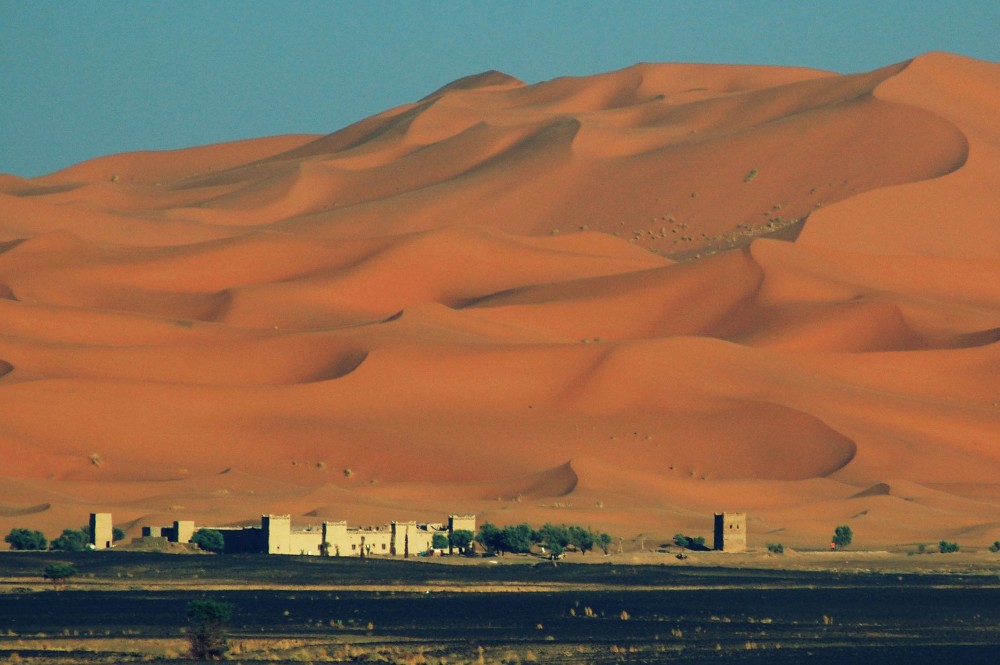
McDonagh: What’s weird, talking about Marvel, is that you arrive at the place, and you look at these dunes that suddenly appear. It looks CGI. So it’s strange. The dunes are so orange and the skies are so blue, you’re sort of, ‘We’re gonna have to sort of dampen this down because it’s too CGI.’
Eves: Too perfect.
BTL: Morocco has a pretty strong infrastructure for filming since they’ve shot a lot of movies there.
McDonagh: What we found was that the movies they make are all the American military getting into firefights in the desert. They’re not really used to dramas with lots of different A-list actors coming in, and all that kind of thing. You have to get them to get their heads around, ‘It’s not just going to be a bunch of grunts playing soldiers.’
Eves: We had a lot of support from the CCM (Centre Cinematographique Marocain), which is the film commission in Morocco. They have a tax rebate that they let international and local filmmakers access and they facilitate some things. We obviously had crew on the ground, so it’s set-up… I would say it’s a moderate Arabic culture, and to get those sort of visuals and be able to get a film in and out, it’s a good place to shoot.
McDonagh: And obviously, there are gay characters in it, and there were no problems with censorship. They never tried to do anything about that.
Eves: Women on the crew felt safe, there was never any… it’s a very moderate Arabic-Muslim country
McDonagh: They would have read the script, and they would have seen that the Moroccan characters are quite prevalent. They actually brought the narrative forward, and that would be a plus as well.
BTL: You have a great cast, but the one actor who really impressed me was the one who plays the boy’s father.
Eves: Ismael Kanater.
McDonagh: He actually lives in Las Vegas. He was a theater actor in Morocco, and I was talking to the two actors who play the servants. One of them said, “Oh, Ismael. He’s like the Moroccan Al Pacino.” I didn’t realize his stature within the Moroccan theater scene. I was initially worried about that, because he’s gonna have to go head to head with Ralph, literally, because they were massive close-ups. Everything was fine. Never any problem, and all the Moroccan actors were terrific.
Eves: We had a great Moroccan casting director, Salah Benchegra.
McDonagh: I’m glad you asked that, because I recently did an interview with [redacted], and the half-hour was spent talking about all the Western actors. He never mentioned the Moroccans at all!
Eves: Ismael, he goes by “Sam,” he came to Toronto. He’s on the red carpet with Jessica. If you see some of the pictures, you’ve got Mourad Zaoui, who plays Hamid, on one side, and you’ve got Sam on the other side of Jessica Chastain.
BTL: You did an interesting thing by putting all the credits upfront before the movie starts, and then sort of going backward and ending on the actors. That used to be the norm and something Gaspar Noe has done recently, but it’s not nearly as common as it used to be.
McDonagh: Yeah, he comes up with a new thing each time. The one I can remember is Robert Aldrich’s Kiss Me Deadly, I think all the credits were upfront. A lot of that time in the 40s and 50s, they’d do a lot of the credits, and you’d get minimal stuff for the back. It would just go to “The End,” which is what I was trying to aspire to. That even lasted all the way up to the 70s, where you’d watch a ’70s movie that has a bleak ending, and then [it would just end].
In those days, you didn’t have all the contractual requirements for people to get their credits, so filmmakers could get away with just doing minimal credits. I had to actually shoot and plan a sequence where we could get all these contractual credits upfront without diminishing the images. But then, you would have to recut the sequence slightly, because you start realizing, “Oh, no, we’ve missed somebody. There are other people who have to come here.”
Eves: [Title] cards were a matrix. I ran a giant spreadsheet for what, to me, felt like the longest time to try to figure out, “How are we going to pull this off?” because there are a lot of people in the cards and positioning within the cards.
McDonagh: And the actors’ credits, they have their own [rules] where they fall, so we have to work out that kind of stuff.
BTL: As I watched the movie, I kept wondering when you were going to list the actors. It’s a way into those opening credits, and usually, they’re listed first.
McDonagh: Yeah, exactly, and then, of course, the shock is when the film ends, that’s it. Curtains. Which people aren’t used to anymore, and so when we showed it in Toronto, there was a slight shock. ‘Oh, that’s it? We gotta get up and go.’
Eves: I guess filmmakers are interested, too, because it’s palpable, people’s feelings in the room, especially in the more dramatic moments that satisfy. You can feel people leaning in.
McDonagh: I sort of see this film as a companion piece to Calvary, but what’s interesting [about] Calvary [is], it has, in quotes, a “bleak ending.” But then you get these post-credits, where you see where Brendan Gleeson and Kelly Reilly spent time together, but now they’re empty. But that gives the audience time to process what they’ve seen, but in this one, there’s no process. It’s just black, so we’ll see what happens.
BTL: Since this has been done since Toronto, have you been working on something else to direct next?
McDonagh: Hopefully gonna do a film with Christopher Abbott and Abbey Lee in the outback of Australia next March, which is called Fear is the Rider. I’m starting to call it an elevated thriller. Has anybody used that phrase yet? They use elevated horror. It’s become a thing now. Why can’t it just be a horror movie? I’ve also written the third part of the Calvary trilogy, called The Lame Shall Enter First, so probably do that after Fear is the Rider, but it’s a tricky one because half of the characters in the film would have to be played by disabled actors, who are probably going to be unknowns, so it’ll be tricky for the financing but we’ll see how it goes.
The Forgiven is now playing in select theaters. All photos courtesy of Roadside Attractions and Vertical Entertainment.





